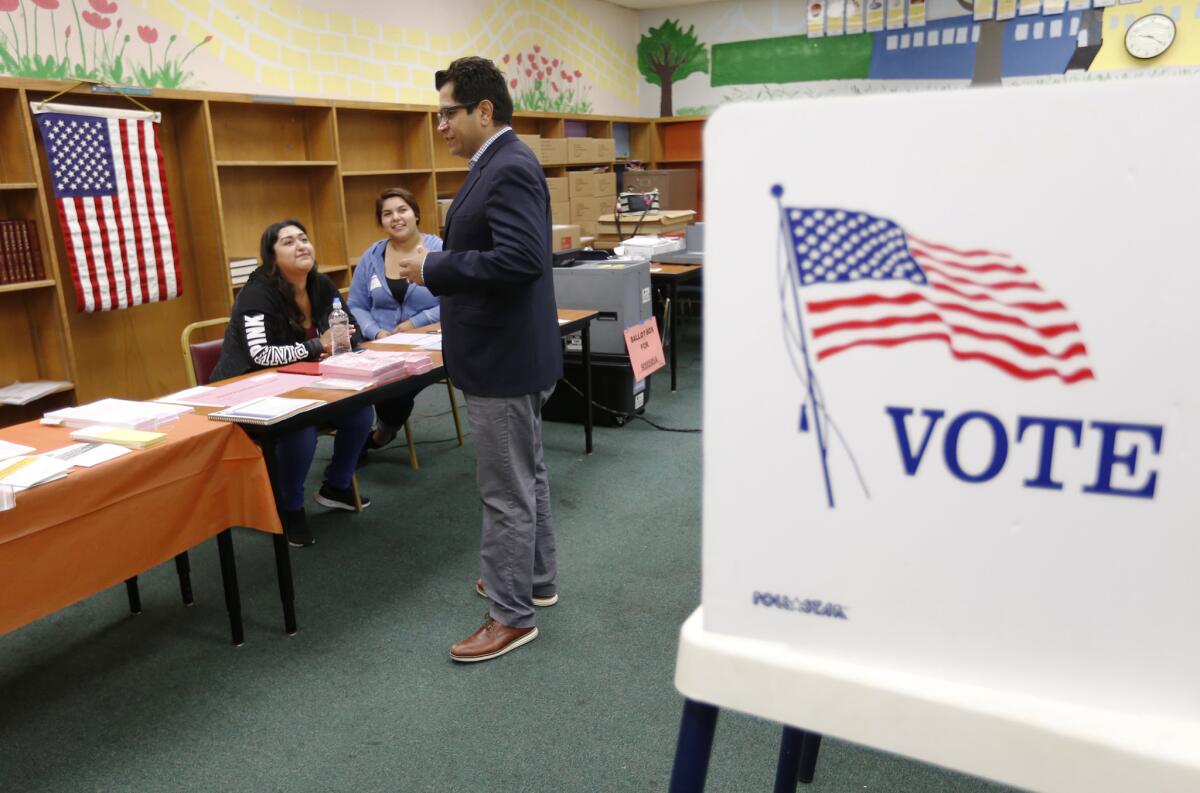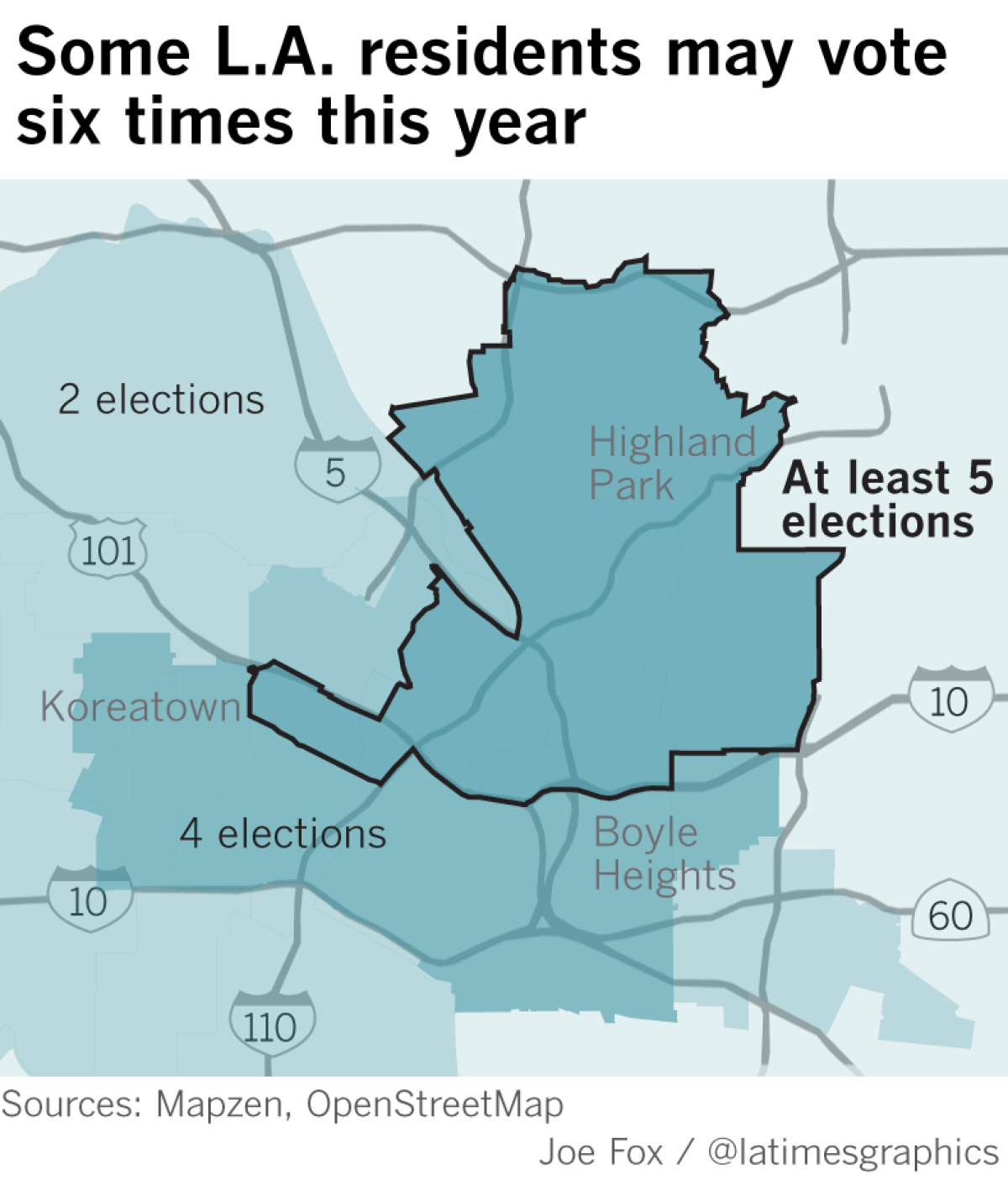Thousands of Angelenos have voted four times in four months. Soon, they’ll be asked to vote again

- Share via
Los Angeles might as well rename Tuesday and call it election day instead. That’s been the joke in some corners of the city, where voters have been asked to go to the polls four times in the past four months.
With Assemblyman Jimmy Gomez heading to Congress after winning last week’s special election to replace
In the doldrums of odd-numbered years, L.A. politics often focuses on elections for mayor and city council. But 2017 has felt like overkill even for the most die-hard voters.
“It’s like a never-ending cycle since November,” said Amanda Santos, a stay-at-home mom and part-time bookseller who lives in Montecito Heights.
She has cast a ballot every month since March, when L.A. Mayor
A month later, 23 candidates stacked the ballot in the primary to replace Becerra, and six weeks after that, there was a hotly contested runoff between L.A. Councilman
That means for the better part of six months, the likeliest voters in central and northeast Los Angeles have been inundated with incessant phone calls, stacks of mailers and volunteers knocking on their doors for one campaign or another.
Santos said she’s voted in pretty much every election since she turned 18, even when she lived abroad. But this year has been a bit much.
“I see a lot of fatigue with some of my friends who are in the same district,” said Santos, 36.
Marc Caswell, an urban planning consultant who lives in Silver Lake, said he came home after voting on Measure C only to find yet another ballot for the Gomez-Ahn runoff waiting for him in his mailbox.
Caswell likes to joke that his 6-month-old, Silas, has been to the polls more times than most adults. Last Tuesday, after he dropped off his ballot for the congressional race, Caswell posted a picture on Instagram of the baby in his stroller, a row of voting booths behind him.
Later that day, he told a friend, “Well, thankfully it’s all over.” His friend had to remind him that at least one more election is required to replace Gomez in the Legislature.
Nine candidates have already said they are running for Gomez’s seat. If none of them receive more than 50% of the vote in a yet-to-be-called special election for the 51st Assembly District, there will be a runoff. The election dates haven’t been set because Gomez must first resign his seat, which he likely won’t do until the election results are certified Friday.
L.A. County registrar Dean Logan said state law governing special elections requires that special elections be held at least 126 days after the governor proclaims an election to fill the vacancy. By the time Becerra stepped down from Congress after he was appointed California’s attorney general in January, it was too late to combine the election for his successor with any of the city races.

State records show there have been more than 50 special elections in California over the past decade. In L.A. County alone, special elections cost taxpayers $22.7 million between 2008 and 2015. The two 34th Congressional District elections conducted this year will add an estimated $2.6 million.
Turnout in the elections ranged from less than 11% of voters in May’s city races to about 20% in March’s mayoral election. About 14% of voters cast ballots in each of the 34th Congressional District elections.
“I don’t think you can blame people when you have four elections in this short of a time,” said Mike Samonek, 48, a voter in Mount Washington. Samonek said he didn’t used to vote in local elections, but he and his wife made a pact to vote in every race after Donald Trump’s presidential victory in November.
“It’s frustrating because I think when these politicians see that nobody’s turning out to vote … they realize those [voters] are the only people they have to appeal to or think about.” Samonek said.
Starting in 2020, L.A. city elections will coincide with state and federal elections, which will cut down on the number of races in odd years. But federal law requires vacancies in the House to be filled by special election rather than appointment, and efforts to allow the governor to fill most legislative vacancies by appointment rather than a special election have failed in the past.
Kim Alexander, president of the nonpartisan California Voter Foundation, which advocates for voters’ rights, suggested one way to limit the “cascading effect” of special elections spurred by politicians looking to advance: Enact a law that would require elected officials to resign before running for another position. Five states have such laws.
This might prevent situations where incumbents such as Gomez can jump into another race with little political risk.
It would also have forced Kamala Harris to give up her post as attorney general before her successful run for U.S. Senate — a victory that triggered Becerra’s appointment, the special congressional election that replaced him with Gomez, and soon, an Assembly special election to replace Gomez.
“I think we have to look back at the root cause and what is causing these vacancies in the first place,” Alexander said.
Times staff writer John Myers contributed to this report.
For more on California politics, follow @cmaiduc.
ALSO
Jimmy Gomez wins Los Angeles congressional election to replace Xavier Becerra
MAP: How Jimmy Gomez became L.A.'s newest member of Congress
Updates on California politics
Get the L.A. Times Politics newsletter
Deeply reported insights into legislation, politics and policy from Sacramento, Washington and beyond. In your inbox three times per week.
You may occasionally receive promotional content from the Los Angeles Times.








